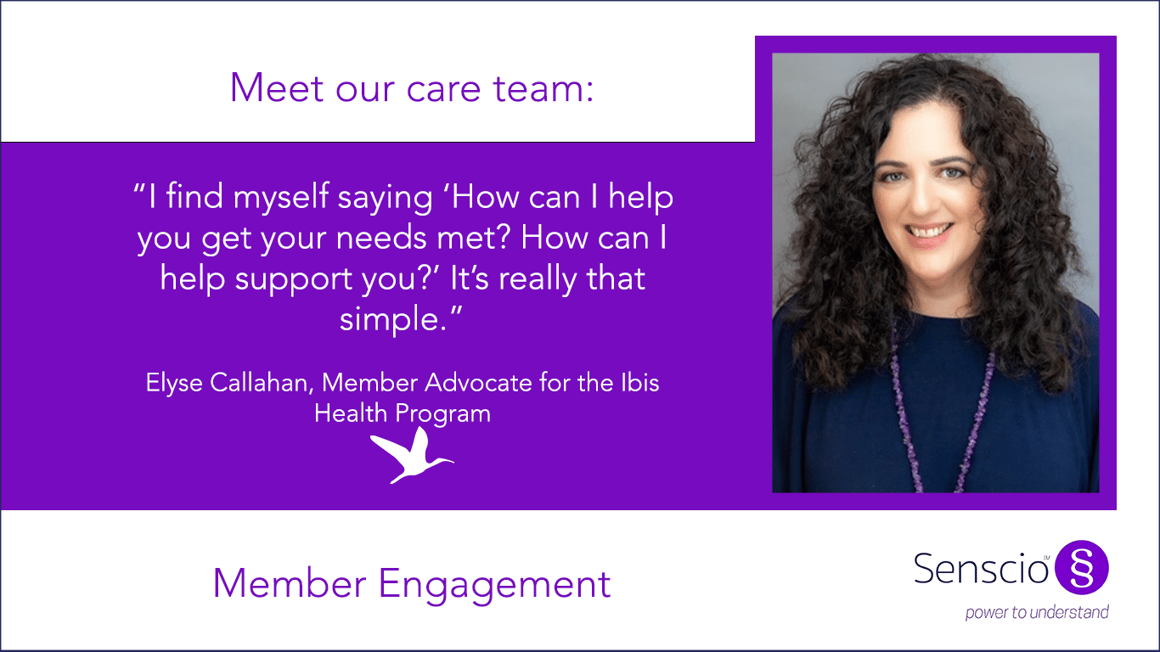The importance of member engagement in managing chronic health conditions

Have you ever set a goal for yourself — lose a few pounds, maybe become more active — but then just couldn’t figure out a way to get there?
If so, you are not alone. Roughly 92 percent of Americans who make New Year’s resolutions fail to keep them after just a few weeks, according to a 2012 study conducted by the University of Scranton.
But the research also suggests you might have a better chance of achieving your goals if you have support from others — a cheerleader or two on your side. That’s where Ibis Health comes in.
Every month, Ibis Health members receive a call from a member advocate to provide friendly encouragement, connect them with resources and review their progress. Available by phone and text, advocates are also connected to members through the IbisHub tablet, where members can send and receive messages any time they have questions or need help.
These advocates serve as personal cheerleaders, spurring members on so they can achieve their health goals and live well on their terms, said Elyse Callahan, a board-certified health coach and member advocate with the Ibis Health support team.
“Everyone is wired differently. The medical field and the psychiatry field, they like to put people in boxes and diagnoses,” said Callahan, who, prior to joining Ibis Health, worked with the U.S. Veterans Health Administration and has a background in yoga and mindfulness instruction. “But I like to look at people as a connection of their wiring, as a human being, as an individual, and find ways to empower them to see that there are many ways through, out, and around their problems. Nobody is truly stuck.”
Why did you become a member advocate for the Ibis Health program?“We have an opportunity to work with people who are managing chronic illnesses, but maybe don’t have the tools and skills to navigate them, because their doctors are busy and just with the way the health care system is. To be able to just give people that hope and remind them of what’s available to them around their chronic illnesses, is what attracted me to this role. I think people want to feel better. Most people even know the things they need to do to feel better, whether it’s make changes to their diet or quit smoking. It’s finding out what matters most to them: Where do they see their future self and what can they do today to help their future self?” |
How do you and the rest of the support team work to build relationships with members?“In the beginning, we do more frequent calls, longer calls, a little more training. You might be on the phone for an hour with someone. A lot of it has to do with that early partnering and that trust building. We assure them that they don’t have to avoid topics with us. We also try to get them to build that initial habit of using the tablet. There’s always a way to support them. We have an awesome message feature on the tablet that I use frequently. If I can see my member had cataract surgery, maybe I will send them a message or send them a card in the mail. I’ll mail them something, just so they know that their advocate is thinking of them. They know that it’s not just a monthly call. We are invested in their journey, not in the outcome. They are the ones who are going to determine the outcome; we have no control over that. We are invested side-by-side, partnering in the journey.” Could you share an example of what that partnering looks like?“The first person that comes to mind is a member who struggles with physical and mental health challenges, including auditory hallucinations or hearing voices. He also has extremely erratic blood pressure, but he was really anxious because of the voices. I was able to share his at-home vitals with his cardiologist and primary care doctor on a weekly basis, providing care coordination to best manage his blood pressure. And we’ve been able to connect him with a therapist who takes him on rides to talk about his struggles, but not in that clinical setting. He has since quit smoking, and incorporated healthy foods and smoothies into his diet. Through our calls, he’s figuring out what he wants to work on, remembering his strengths and focusing on what matters most to ensure his continued success. His story is really inspiring!”
|
To learn more about Senscio Systems and its innovative Ibis Health Program visit www.sensciosystems.com and www.ibishealth.org.
Want to receive more insightful articles like this? Sign-up for our free monthly e-newsletter:






